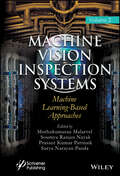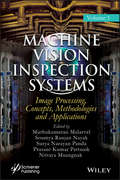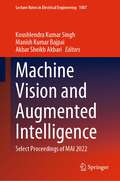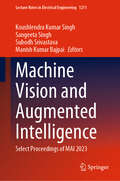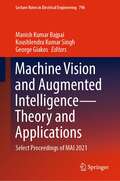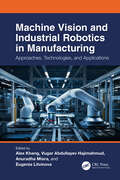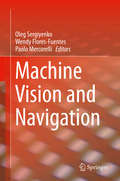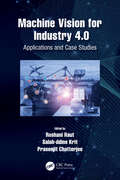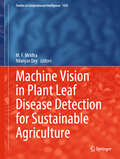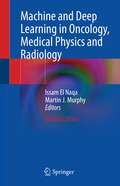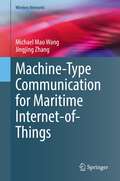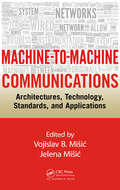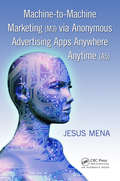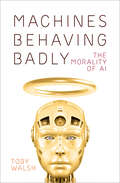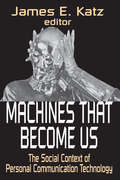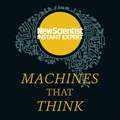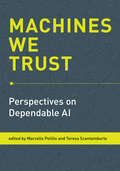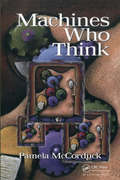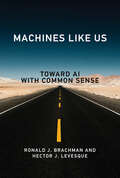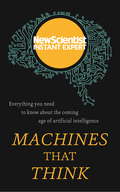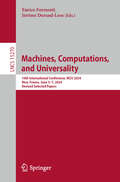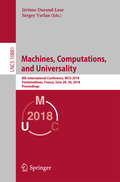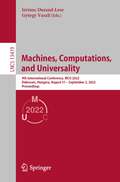- Table View
- List View
Machine Vision Inspection Systems, Machine Learning-Based Approaches
by Prasant Kumar Pattnaik Muthukumaran Malarvel Soumya Ranjan Nayak Surya Narayan PandaMachine Vision Inspection Systems (MVIS) is a multidisciplinary research field that emphasizes image processing, machine vision and, pattern recognition for industrial applications. Inspection techniques are generally used in destructive and non-destructive evaluation industry. Now a day's the current research on machine inspection gained more popularity among various researchers, because the manual assessment of the inspection may fail and turn into false assessment due to a large number of examining while inspection process. This volume 2 covers machine learning-based approaches in MVIS applications and it can be employed to a wide diversity of problems particularly in Non-Destructive testing (NDT), presence/absence detection, defect/fault detection (weld, textile, tiles, wood, etc.,), automated vision test & measurement, pattern matching, optical character recognition & verification (OCR/OCV), natural language processing, medical diagnosis, etc. This edited book is designed to address various aspects of recent methodologies, concepts, and research plan out to the readers for giving more depth insights for perusing research on machine vision using machine learning-based approaches.
Machine Vision Inspection Systems: Image Processing, Concepts, Methodologies, and Applications
by Prasant Kumar Pattnaik Muthukumaran Malarvel Soumya Ranjan Nayak Surya Narayan Panda Nittaya MuangnakThis edited book brings together leading researchers, academic scientists and research scholars to put forward and share their experiences and research results on all aspects of an inspection system for detection analysis for various machine vision applications. It also provides a premier interdisciplinary platform to present and discuss the most recent innovations, trends, methodology, applications, and concerns as well as practical challenges encountered and solutions adopted in the inspection system in terms of image processing and analytics of machine vision for real and industrial application.Machine vision inspection systems (MVIS) utilized all industrial and non-industrial applications where the execution of their utilities based on the acquisition and processing of images. MVIS can be applicable in industry, governmental, defense, aerospace, remote sensing, medical, and academic/education applications but constraints are different. MVIS entails acceptable accuracy, high reliability, high robustness, and low cost. Image processing is a well-defined transformation between human vision and image digitization, and their techniques are the foremost way to experiment in the MVIS. The digital image technique furnishes improved pictorial information by processing the image data through machine vision perception. Digital image processing has widely been used in MVIS applications and it can be employed to a wide diversity of problems particularly in Non-Destructive testing (NDT), presence/absence detection, defect/fault detection (weld, textile, tiles, wood, etc.,), automated vision test & measurement, pattern matching, optical character recognition & verification (OCR/OCV), barcode reading and traceability, medical diagnosis, weather forecasting, face recognition, defence and space research, etc. This edited book is designed to address various aspects of recent methodologies, concepts and research plan out to the readers for giving more depth insights for perusing research on machine vision using image processing techniques.
Machine Vision and Augmented Intelligence: Select Proceedings of MAI 2022 (Lecture Notes in Electrical Engineering #1007)
by Manish Kumar Bajpai Koushlendra Kumar Singh Akbar Sheikh AkbariThis book comprises the proceedings of the International Conference on Machine Vision and Augmented Intelligence (MAI 2022). The conference proceedings encapsulate the best deliberations held during the conference. The diversity of participants in the event from academia, industry, and research reflects in the articles appearing in the book. The book encompasses all industrial and non-industrial applications. This book covers a wide range of topics such as modeling of disease transformation, epidemic forecast, image processing, and computer vision, augmented intelligence, soft computing, deep learning, image reconstruction, artificial intelligence in health care, brain-computer interface, cybersecurity, social network analysis, and natural language processing.
Machine Vision and Augmented Intelligence: Select Proceedings of MAI 2023 (Lecture Notes in Electrical Engineering #1211)
by Sangeeta Singh Manish Kumar Bajpai Koushlendra Kumar Singh Subodh SrivastavaThis book comprises the proceedings of the International Conference on Machine Vision and Augmented Intelligence (MAI 2023). The conference proceedings encapsulate the best deliberations held during the conference. The diversity of participants in the event from academia, industry, and research reflects in the articles appearing in the volume. The book theme encompasses all industrial and non-industrial applications in which a combination of hardware and software provides operational guidance to devices in the execution of their functions based on the capture and processing of images. This book covers a wide range of topics such as modeling of disease transformation, epidemic forecast, COVID-19, image processing and computer vision, augmented intelligence, soft computing, deep learning, image reconstruction, artificial intelligence in healthcare, brain-computer interface, cybersecurity, and social network analysis, natural language processing, etc.
Machine Vision and Augmented Intelligence—Theory and Applications: Select Proceedings of MAI 2021 (Lecture Notes in Electrical Engineering #796)
by Manish Kumar Bajpai Koushlendra Kumar Singh George GiakosThis book comprises the proceedings of the International Conference on Machine Vision and Augmented Intelligence (MAI 2021) held at IIIT, Jabalpur, in February 2021. The conference proceedings encapsulate the best deliberations held during the conference. The diversity of participants in the event from academia, industry, and research reflects in the articles appearing in the volume. The book theme encompasses all industrial and non-industrial applications in which a combination of hardware and software provides operational guidance to devices in the execution of their functions based on the capture and processing of images. This book covers a wide range of topics such as modeling of disease transformation, epidemic forecast, COVID-19, image processing and computer vision, augmented intelligence, soft computing, deep learning, image reconstruction, artificial intelligence in healthcare, brain-computer interface, cybersecurity, and social network analysis, natural language processing, etc.
Machine Vision and Industrial Robotics in Manufacturing: Approaches, Technologies, and Applications
by Alex Khang Anuradha Misra Eugenia Litvinova Vugar Abdullayev HajimahmudThis book covers the basics of machine vision and robotics in the manufacturing industry. Major applicability of intelligent machines and robotics in the manufacturing sector are explored in three major areas of product traceability, remote product-monitoring, supply chain, logistics, and product record management. Machine Vision and Industrial Robotics in Manufacturing: Approaches, Technologies, and Applications explains advanced technologies based on Artificial Intelligence and Industrial Internet of Things related to smart manufacturing applications.The book introduces the emerging machines and robotics applications that are enabling smart factories initiatives worldwide. The chapters examine labor productivity, factory device installation, and defective product detection. The authors share modern models, emerging technologies, designs, frameworks, theories, practices, and sustainable approaches to design and implement machine vision with industrial robotics. They also examine the challenging issues associated with the leveraging of technologies related to machine vision, computer vision, robotics, Internet of Things, Industrial Internet of Things technologies, Artificial Intelligence-equipped machines, applications, and automatic techniques for intelligent manufacturing systems and smart factory infrastructure in the era of Industry 4.0 manufacturing. The authors also examine topics such as the role of existing management and production solutions, their limitations, and future directions in manufacturing industry.This book targets a mixed audience of students, engineers, scholars, researchers, academics, and professionals who are learning, researching, and working in the field of machine vision, Artificial Intelligence, Industrial Internet of Things, computer vision, and robotic technologies from different industries and economics.
Machine Vision and Navigation
by Oleg Sergiyenko Wendy Flores-Fuentes Paolo MercorelliThis book presents a variety of perspectives on vision-based applications. These contributions are focused on optoelectronic sensors, 3D & 2D machine vision technologies, robot navigation, control schemes, motion controllers, intelligent algorithms and vision systems. The authors focus on applications of unmanned aerial vehicles, autonomous and mobile robots, industrial inspection applications and structural health monitoring. Recent advanced research in measurement and others areas where 3D & 2D machine vision and machine control play an important role, as well as surveys and reviews about vision-based applications. These topics are of interest to readers from diverse areas, including electrical, electronics and computer engineering, technologists, students and non-specialist readers.• Presents current research in image and signal sensors, methods, and 3D & 2D technologies in vision-based theories and applications; • Discusses applications such as daily use devices including robotics, detection, tracking and stereoscopic vision systems, pose estimation, avoidance of objects, control and data exchange for navigation, and aerial imagery processing; • Includes research contributions in scientific, industrial, and civil applications.
Machine Vision for Industry 4.0: Applications and Case Studies
by Roshani RautThis book discusses the use of machine vision and technologies in specific engineering case studies and focuses on how machine vision techniques are impacting every step of industrial processes and how smart sensors and cognitive big data analytics are supporting the automation processes in Industry 4.0 applications. Industry 4.0, the Fourth Industrial Revolution, combines traditional manufacturing with automation and data exchange. Machine vision is used in the industry for reliable product inspections, quality control, and data capture solutions. It combines different technologies to provide important information from the acquisition and analysis of images for robot-based inspection and guidance. Features Presents a comprehensive guide on how to use machine vision for Industry 4.0 applications, such as analysis of images for automated inspections, object detection, object tracking, and more Includes case studies of Robotics Internet of Things with its current and future applications in healthcare, agriculture, and transportation Highlights the inclusion of impaired people in the industry, for example, an intelligent assistant that helps deaf-mute individuals to transmit instructions and warnings in a manufacturing process Examines the significant technological advancements in machine vision for Industrial Internet of Things and explores the commercial benefits using real-world applications from healthcare to transportation Discusses a conceptual framework of machine vision for various industrial applications The book addresses scientific aspects for a wider audience such as senior and junior engineers, undergraduate and postgraduate students, researchers, and anyone interested in the trends, development, and opportunities for machine vision for Industry 4.0 applications.
Machine Vision in Plant Leaf Disease Detection for Sustainable Agriculture (Studies in Computational Intelligence #1202)
by Nilanjan Dey M. F. MridhaThis book offers a comprehensive exploration of the intersection between advanced technology and agricultural sustainability. With a focus on leveraging machine vision techniques for the early detection and management of plant diseases, this book serves as a vital resource for researchers, practitioners, and stakeholders in the agricultural sector. The book begins by providing an overview of the challenges posed by plant diseases to global food security and agricultural sustainability. It highlights the limitations of traditional disease detection methods and underscores the need for innovative approaches that can offer timely and accurate diagnosis. Through a systematic examination of machine vision principles and methodologies, the book delves into the various stages of disease detection, from image acquisition to feature extraction and classification. Key concepts such as image preprocessing, feature selection, and machine learning algorithms are discussed in detail, with emphasis on their practical implementation in real-world scenarios. Moreover, the book explores the potential of machine vision to contribute to sustainable agriculture practices.
Machine and Deep Learning in Oncology, Medical Physics and Radiology
by Issam El Naqa Martin J. MurphyThis book, now in an extensively revised and updated second edition, provides a comprehensive overview of both machine learning and deep learning and their role in oncology, medical physics, and radiology. Readers will find thorough coverage of basic theory, methods, and demonstrative applications in these fields. An introductory section explains machine and deep learning, reviews learning methods, discusses performance evaluation, and examines software tools and data protection. Detailed individual sections are then devoted to the use of machine and deep learning for medical image analysis, treatment planning and delivery, and outcomes modeling and decision support. Resources for varying applications are provided in each chapter, and software code is embedded as appropriate for illustrative purposes. The book will be invaluable for students and residents in medical physics, radiology, and oncology and will also appeal to more experienced practitioners and researchers and members of applied machine learning communities.
Machine-Type Communication for Maritime Internet-of-Things: From Concept to Practice (Wireless Networks)
by Jingjing Zhang Michael Mao WangThis book introduces the concept of machine-type communication (MTC) for maritime Internet of Things. The first part of the book portrays a maritime MTC system from an architectural perspective and describes an MTC framework and the fundamental components, laying out a foundation that leads to an ultimate solution to the maritime IoT requirements and challenges. The second part ties together all discussed in the first part and demonstrates how to apply it to a practical system through a realistic design example based on an international maritime mobile spectrum. The book serves as a comprehensive tutorial of the maritime MTC from the top (the network architecture) to the bottom (the air/radio interface and regulatory radio spectrum constraints), guiding readers to an easier understanding of the maritime MTC-related issues and the rationale behind the design. The primary readers of this book include maritime communication engineers, maritime IoT professionals, maritime academia, and the general MTC and IoT communities.Presents the concept of machine-type communication (MTC) for maritime Internet of Things (IoT) and its services, requirements, and challenges;Explains space-earth-integrated maritime machine-type communication system architecture with a comparison with its land counterpart;Sets out a comprehensive framework and details the ways to implement it on a practical radio spectrum;Includes maritime MTC radio spectrum and regulations, network design, protocol design, and air interface design.
Machine-to-Machine Communications: Architectures, Technology, Standards, and Applications
by Vojislav B. Mišić Jelena MišićWith the number of machine-to-machine (M2M)-enabled devices projected to reach 20 to 50 billion by 2020, there is a critical need to understand the demands imposed by such systems. Machine-to-Machine Communications: Architectures, Technology, Standards, and Applications offers rigorous treatment of the many facets of M2M communication, including it
Machine-to-Machine Marketing (M3) via Anonymous Advertising Apps Anywhere Anytime (A5)
by Jesus MenaIn today's wireless environment, marketing is more frequently occurring at the server-to-device level-with that device being anything from a laptop or phone to a TV or car. In this real-time digital marketplace, human attributes such as income, marital status, and age are not the most reliable attributes for modeling consumer behaviors. A more effe
Machines Behaving Badly: The Morality of AI
by Toby WalshCan we build moral machines?Artificial intelligence is an essential part of our lives – for better or worse. It can be used to influence what we buy, who gets shortlisted for a job and even how we vote. Without AI, medical technology wouldn’t have come so far, we’d still be getting lost in our GPS-free cars, and smartphones wouldn’t be so, well, smart. But as we continue to build more intelligent and autonomous machines, what impact will this have on humanity and the planet?Professor Toby Walsh, a world-leading researcher in the field of artificial intelligence, explores the ethical considerations and unexpected consequences AI poses. Can AI be racist? Can robots have rights? What happens if a self-driving car kills someone? What limitations should we put on the use of facial recognition? Machines Behaving Badly is a thought-provoking look at the increasing human reliance on robotics and the decisions that need to be made now to ensure the future of AI is a force for good, not evil.
Machines That Become Us: The Social Context of Personal Communication Technology
by James E. KatzSocial critics and artificial intelligence experts have long prophesized that computers and robots would soon relegate humans to the dustbin of history. Many among the general population seem to have shared this fear of a dehumanized future. But how are people in the twenty-first century actually reacting to the ever-expanding array of gadgets and networks at their disposal? Is computer anxiety a significant problem, paralyzing and terrorizing millions, or are ever-proliferating numbers of gadgets being enthusiastically embraced? Machines that Become Us explores the increasingly intimate relationship between people and their personal communication technologies.In the first book of its kind, internationally recognized scholars from the United States and Europe explore this topic. Among the technologies analyzed include the Internet, personal digital assistants (PDAs), mobile phones, networked homes, smart fabrics and wearable computers, interactive location badges, and implanted monitoring devices. The authors discuss critical policy issues, such as the problems of information resource access and equity, and the recently discovered digital dropouts phenomena.The use of the word become in the book's title has three different meanings. The first suggests how people use these technologies to broaden their abilities to communicate and to represent themselves to others. Thus the technologies become extensions and representatives of the communicators. A second sense of become applies to analysis of the way these technologies become physically integrated with the user's clothing and even their bodies. Finally, contributors examine fashion aspects and uses of these technologies, that is, how they are used in ways becoming to the wearer. The conclusions of many chapters are supported by data, including ethnographic observations, attitude surveys and case studies from the United States, Britain, France, Italy, Finland, and Norway. This approach is especially valuable
Machines That Think: Everything You Need to Know About the Coming Age of Artificial Intelligence (New Scientist Instant Expert)
by New ScientistMachines That Think explores how artificial intelligence helps us understand human intelligence, machines that compose music and write stories - and asks if AI is really a threat. <p><p>Sometime in the future the intelligence of machines will exceed that of human brain power. So are we on the edge of an AI-pocalypse, with superintelligent devices superseding humanity, as predicted by Stephen Hawking? Or will this herald a kind of Utopia, with machines doing a far better job at complex tasks than us? <p><p>You might not realise it, but you interact with AIs every day. They route your phone calls, approve your credit card transactions and help your doctor interpret results. Driverless cars will soon be on the roads with a decision-making computer in charge. But how do machines actually think and learn? <p><p>In Machines That Think, AI experts and New Scientist explore how artificial intelligence helps us understand human intelligence, machines that compose music and write stories - and ask if AI is really a threat. <P><P>ABOUT THE SERIES <p>New Scientist Instant Expert books are definitive and accessible entry points to the most important subjects in science; subjects that challenge, attract debate, invite controversy and engage the most enquiring minds. Designed for curious readers who want to know how things work and why, the Instant Expert series explores the topics that really matter and their impact on individuals, society, and the planet, translating the scientific complexities around us into language that's open to everyone, and putting new ideas and discoveries into perspective and context. <p>(P)2017 Hodder & Stoughton Limited
Machines That Think: The Future of Artificial Intelligence
by Toby WalshA scientist who has spent a career developing Artificial Intelligence takes a realistic look at the technological challenges and assesses the likely effect of AI on the future.How will Artificial Intelligence (AI) impact our lives? Toby Walsh, one of the leading AI researchers in the world, takes a critical look at the many ways in which "thinking machines" will change our world.Based on a deep understanding of the technology, Walsh describes where Artificial Intelligence is today, and where it will take us.·Will automation take away most of our jobs? ·Is a "technological singularity" near? ·What is the chance that robots will take over? ·How do we best prepare for this future? The author concludes that, if we plan well, AI could be our greatest legacy, the last invention human beings will ever need to make.
Machines We Trust: Perspectives on Dependable AI
by Marcello Pelillo Teresa ScantamburloExperts from disciplines that range from computer science to philosophy consider the challenges of building AI systems that humans can trust.Artificial intelligence-based algorithms now marshal an astonishing range of our daily activities, from driving a car ("turn left in 400 yards") to making a purchase ("products recommended for you"). How can we design AI technologies that humans can trust, especially in such areas of application as law enforcement and the recruitment and hiring process? In this volume, experts from a range of disciplines discuss the ethical and social implications of the proliferation of AI systems, considering bias, transparency, and other issues. The contributors, offering perspectives from computer science, engineering, law, and philosophy, first lay out the terms of the discussion, considering the "ethical debts" of AI systems, the evolution of the AI field, and the problems of trust and trustworthiness in the context of AI. They go on to discuss specific ethical issues and present case studies of such applications as medicine and robotics, inviting us to shift the focus from the perspective of a "human-centered AI" to that of an "AI-decentered humanity." Finally, they consider the future of AI, arguing that, as we move toward a hybrid society of cohabiting humans and machines, AI technologies can become humanity's allies.
Machines Who Think: A Personal Inquiry into the History and Prospects of Artificial Intelligence
by Pamela McCorduck Cli CfeThis book is a history of artificial intelligence, that audacious effort to duplicate in an artifact what we consider to be our most important property—our intelligence. It is an invitation for anybody with an interest in the future of the human race to participate in the inquiry.
Machines like Us: Toward AI with Common Sense
by Hector J. Levesque Ronald J. BrachmanHow we can create artificial intelligence with broad, robust common sense rather than narrow, specialized expertise.It&’s sometime in the not-so-distant future, and you send your fully autonomous self-driving car to the store to pick up your grocery order. The car is endowed with as much capability as an artificial intelligence agent can have, programmed to drive better than you do. But when the car encounters a traffic light stuck on red, it just sits there—indefinitely. Its obstacle-avoidance, lane-following, and route-calculation capacities are all irrelevant; it fails to act because it lacks the common sense of a human driver, who would quickly figure out what&’s happening and find a workaround. In Machines like Us, Ron Brachman and Hector Levesque—both leading experts in AI—consider what it would take to create machines with common sense rather than just the specialized expertise of today&’s AI systems. Using the stuck traffic light and other relatable examples, Brachman and Levesque offer an accessible account of how common sense might be built into a machine. They analyze common sense in humans, explain how AI over the years has focused mainly on expertise, and suggest ways to endow an AI system with both common sense and effective reasoning. Finally, they consider the critical issue of how we can trust an autonomous machine to make decisions, identifying two fundamental requirements for trustworthy autonomous AI systems: having reasons for doing what they do, and being able to accept advice. Both in the end are dependent on having common sense.
Machines that Think: Everything you need to know about the coming age of artificial intelligence (Instant Expert Ser.)
by New ScientistSometime in the future the intelligence of machines will exceed that of human brain power. So are we on the edge of an AI-pocalypse, with superintelligent devices superseding humanity, as predicted by Stephen Hawking? Or will this herald a kind of Utopia, with machines doing a far better job at complex tasks than us? You might not realise it, but you interact with AIs every day. They route your phone calls, approve your credit card transactions and help your doctor interpret results. Driverless cars will soon be on the roads with a decision-making computer in charge. But how do machines actually think and learn? In Machines That Think, AI experts and New Scientist explore how artificial intelligence helps us understand human intelligence, machines that compose music and write stories - and ask if AI is really a threat.ABOUT THE SERIESNew Scientist Instant Expert books are definitive and accessible entry points to the most important subjects in science; subjects that challenge, attract debate, invite controversy and engage the most enquiring minds. Designed for curious readers who want to know how things work and why, the Instant Expert series explores the topics that really matter and their impact on individuals, society, and the planet, translating the scientific complexities around us into language that's open to everyone, and putting new ideas and discoveries into perspective and context.
Machines that Think: Everything you need to know about the coming age of artificial intelligence (New Scientist Instant Expert)
by New ScientistSometime in the future the intelligence of machines will exceed that of human brain power. So are we on the edge of an AI-pocalypse, with superintelligent devices superseding humanity, as predicted by Stephen Hawking? Or will this herald a kind of Utopia, with machines doing a far better job at complex tasks than us? You might not realise it, but you interact with AIs every day. They route your phone calls, approve your credit card transactions and help your doctor interpret results. Driverless cars will soon be on the roads with a decision-making computer in charge. But how do machines actually think and learn? In Machines That Think, AI experts and New Scientist explore how artificial intelligence helps us understand human intelligence, machines that compose music and write stories - and ask if AI is really a threat.ABOUT THE SERIESNew Scientist Instant Expert books are definitive and accessible entry points to the most important subjects in science; subjects that challenge, attract debate, invite controversy and engage the most enquiring minds. Designed for curious readers who want to know how things work and why, the Instant Expert series explores the topics that really matter and their impact on individuals, society, and the planet, translating the scientific complexities around us into language that's open to everyone, and putting new ideas and discoveries into perspective and context.
Machines, Computations, and Universality: 10th International Conference, MCU 2024, Nice, France, June 5–7, 2024, Revised Selected Papers (Lecture Notes in Computer Science #15270)
by Jérôme Durand-Lose Enrico FormentiThis book constitutes the refereed proceedings of the 10th International Conference on Machines, Computations, and Universality, MCU 2024, held in Nice, France, during June 5–7, 2024. The 8 full papers and 1 invited paper in this book were carefully reviewed and selected from 14 submissions. The scope of the conference topics includes, but is not limited to, computation in the setting of various discrete models Turing machines, register machines, cellular automata, tile assembly systems, rewriting systems, molecular computing models, neural models, analog and hybrid models, BSS machines, infinite time cellular automata, real machines, quantum computing, and the meaning and implantation of universality in these contexts.
Machines, Computations, and Universality: 8th International Conference, MCU 2018, Fontainebleau, France, June 28–30, 2018, Proceedings (Lecture Notes in Computer Science #10881)
by Jérôme Durand-Lose Sergey VerlanThis book constitutes the refereed proceedings of the 8th International Conference on Machines, Computations, and Universality, MCU 2018, held in Fontainebleau, France, in June 2018. The 9 revised full papers presented together with 5 invited talks were carefully reviewed and selected from numerous submissions. MCU explores computation in the setting of various discrete models (Turing machines, register machines, cellular automata, tile assembly systems, rewriting systems, molecular computing models, neural models, concurrent systems, etc.) and analog and hybrid models (BSS machines, infinite time cellular automata, real machines, quantum computing, etc.).
Machines, Computations, and Universality: 9th International Conference, MCU 2022, Debrecen, Hungary, August 31 – September 2, 2022, Proceedings (Lecture Notes in Computer Science #13419)
by Jérôme Durand-Lose György VaszilThis book constitutes the refereed proceedings of the 9th International Conference on Machines, Computations, and Universality, MCU 2022, held in Debrecen, Hungary, in August/September 2022. The 10 revised full papers presented were carefully reviewed and selected from 18 submissions. MCU explores computation in the setting of various discrete models (Turing machines, register machines, cellular automata, tile assembly systems, rewriting systems, molecular computing models, neural models, concurrent systems, etc.) and analog and hybrid models (BSS machines, infinite time cellular automata, real machines, quantum computing).
